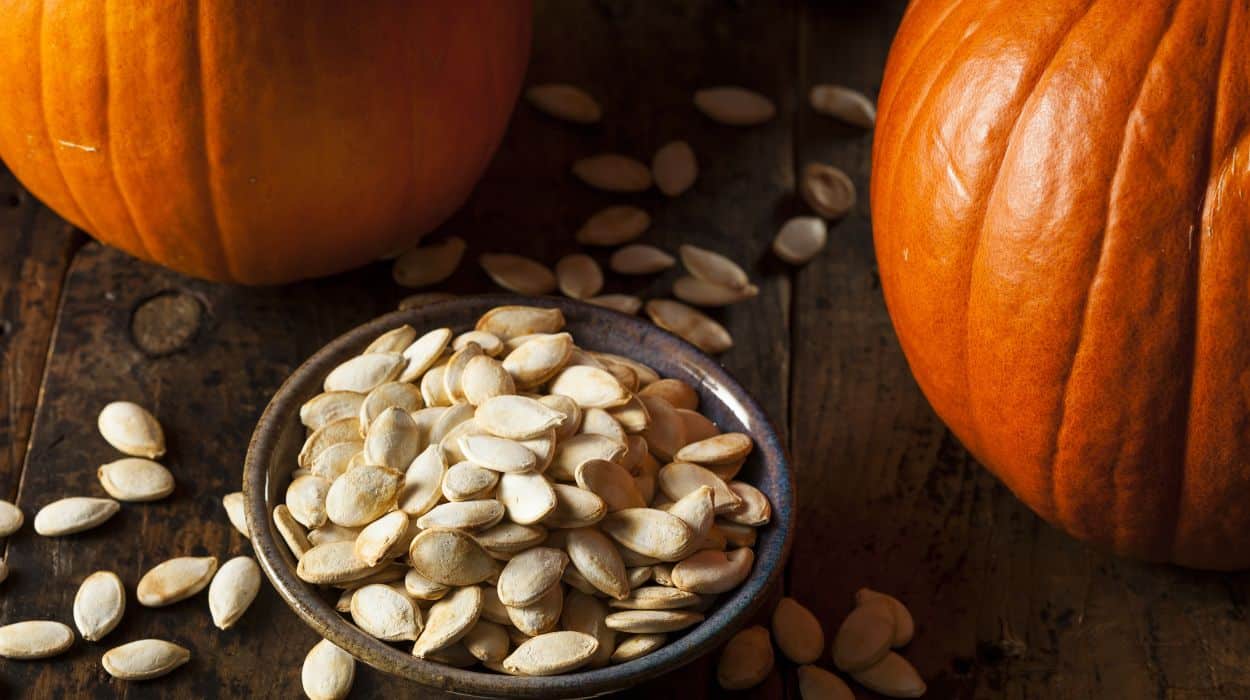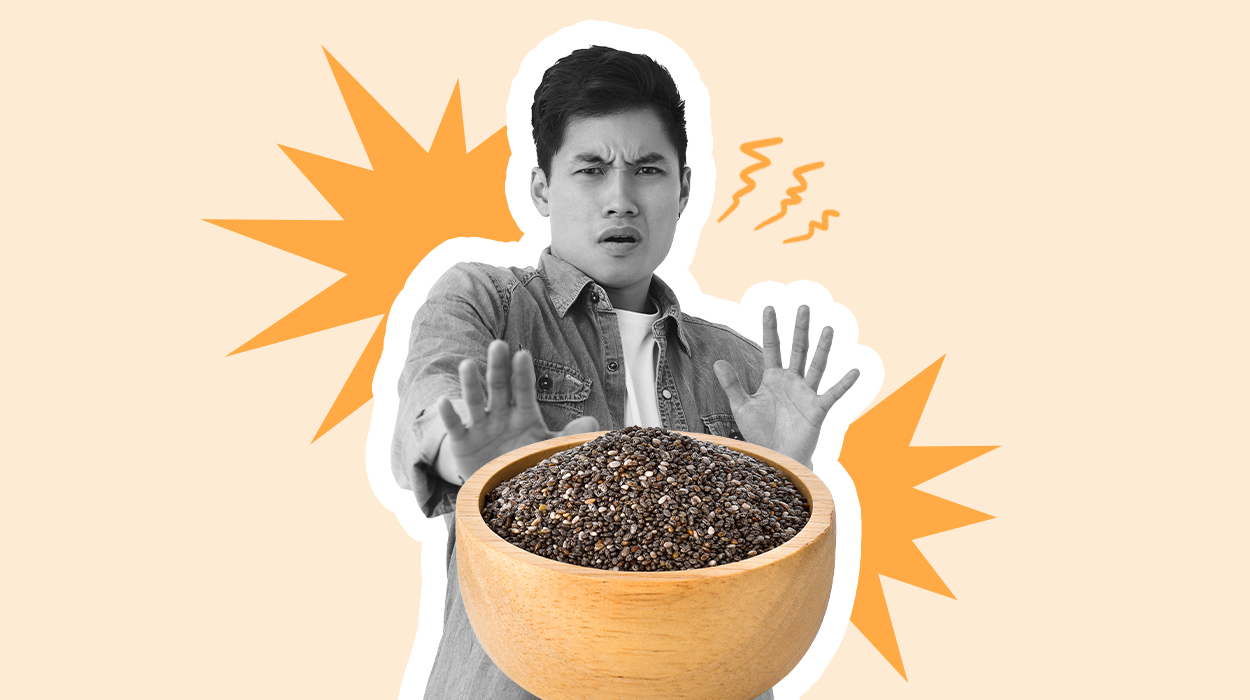Chia seeds are one of the foods that have gained increased attention over the past few years, as this superfood is jam-packed with beneficial nutrients. These small but mighty seeds are packed with essential nutrients like fiber, protein, and omega-3 fatty acids, making them an excellent addition to a healthy diet.
There are various ways to ingest chia seeds such as chia seed pudding, chia seed flour, dry chia seeds, ground chia seeds, and chia seed oil, among others. We are going to talk about the potential side effects of eating whole chia seeds, as there can be side effects specific to each form.
However, despite their many benefits, there are some potential side effects that you should be aware of when you eat chia seeds. This is why we have created this article, so you have all the information if and when you start to incorporate chia seeds into your diet!
Chia Seeds Side Effects That You Need To Know
- Allergic reactions, particularly for those with nut or seed allergies
- May lower blood pressure
- Increase bleeding risk, so caution is advised for people taking blood-thinning medications
- Inhibition of mineral absorption due to phytic acid content
- Digestive issues such as bloating, gas, and constipation
5 Dangers Of Chia Seeds That You Must Know
Allergic Reaction

Like any other food, these tiny seeds can potentially cause an allergic reaction in some people. Chia seeds are a member of the mint family and contain proteins that can trigger an allergic reaction in individuals who are sensitive to them.
Symptoms of a chia seed allergy can range from mild to severe and may include skin rash, hives, itching, difficulty breathing, and anaphylaxis, a life-threatening allergic reaction. The severity of the reaction can vary from person to person, and in some cases, an allergy to chia seeds can be mistaken for an allergy to other foods.
It is essential to be aware of the potential for chia seeds to cause an allergic reaction, especially if you have a history of food allergies. If you experience any symptoms after consuming chia seeds, it is crucial to avoid chia seeds consumption and seek medical attention immediately. It is also recommended to speak with your doctor before adding chia seeds to your diet, particularly if you have a history of food allergies or sensitivities.
Blood Thinning
Chia seeds are an excellent source of omega-3 fatty acids, which are essential nutrients for the body. Omega-3s have numerous health benefits, including reducing inflammation, improving heart health, and boosting brain function. However, some people may experience increased bleeding when eating too many chia seeds due to their omega-3 content.
Omega-3 fatty acids[1] can thin the blood and reduce blood clotting, which is beneficial for people at risk of heart disease or stroke. However, it can also increase bleeding in some individuals. This is particularly a concern for people taking blood-thinning medications like warfarin, heparin, or aspirin, as chia seeds can interact with these drugs and increase the risk of bleeding.
It’s important to note that the risk of bleeding from consuming chia seeds is generally low and only affects a small percentage of people eating chia seeds. However, if you are taking blood-thinning medication or have a bleeding disorder, it’s essential to talk to your healthcare provider before adding chia seeds to your diet.
If you are not at risk of bleeding, consuming chia seeds in moderation is unlikely to cause any adverse effects. It’s important to follow the recommended serving sizes and to drink plenty of fluids when consuming chia seeds to prevent choking and ensure proper digestion. Overall, while chia seeds offer many health benefits, it’s essential to be aware of their potential side effects and to consume them responsibly.
Lower Blood Pressure
Chia seeds have been found to have blood pressure-lowering effects[2] due to their high content of dietary fiber, protein, and omega-3 fatty acids. These nutrients work together to improve heart health, improve blood sugar, and reduce the risk of hypertension.
The soluble fiber in chia seeds can help lower high blood pressure by reducing the absorption of cholesterol and improving the function of blood vessels. Protein can also help to lower blood pressure by reducing inflammation in the body and promoting the relaxation of blood vessels, which can lower systolic blood pressure and diastolic numbers of blood pressure. Omega-3 fatty acids can reduce inflammation and improve heart health by reducing the risk of blood clots and improving arterial function.
Several studies[3] have shown that consuming chia seeds can lead to a significant reduction in blood pressure in people with high blood pressure (hypertension). However, it’s important to note that chia seeds should not be used as a substitute for prescribed medication and should only be used as part of a balanced diet and healthy lifestyle. Additionally, those with low blood pressure will want to monitor their blood pressure when eating large quantities of chia seeds or using chia seed supplementation.
Inhibition Of Mineral Absorption
Chia seeds are high in phytic acid,[4] which is an antinutrient that can interfere with the absorption of certain minerals, including calcium, zinc, and iron. Phytic acid is known to bind to these minerals in the digestive tract, making them less available for absorption.
While phytic acid[4] can have some health benefits, such as reducing inflammation and protecting against cancer, it can also lead to mineral deficiencies if consumed in excess. This is particularly a concern for people who rely on these minerals in their diet, such as vegetarians and vegans, who may not consume as much calcium or iron from animal sources.
To reduce the phytic acid content in chia seeds, it’s recommended to soak chia seeds in water or milk overnight before consuming them. This can help to break down the phytic acid and improve mineral absorption.
While chia seeds are a nutritious food, it’s important to be aware of their phytic acid content and to consume them in moderation. Soaking chia seeds before consuming them can help to reduce the risk of mineral deficiencies and ensure proper nutrient absorption.
Digestive Issues
While chia seeds are a great source of fiber, protein, and other nutrients, they can cause digestive issues for some people, especially if consumed in large amounts. Common digestive system issues associated with chia seed consumption include bloating, gas, and constipation.
This is because chia seeds swell up in water and form a gel-like substance in the digestive tract, which can slow down digestion and cause discomfort. It’s also important to note that consuming too much fiber can lead to gastrointestinal distress.
To prevent digestive issues when consuming chia seeds, it’s important to start with small amounts and gradually increase intake over time. Drinking plenty of water and other fluids can also help to prevent constipation and improve digestion.
Alternatives To Chia Seeds

If you’re looking for alternatives to chia seeds, there are several other nutritious options that you can incorporate into your diet. Here are a few examples:
- Flaxseeds: Like chia seeds, flaxseeds are a great source of omega-3 fatty acids and fiber. They can be used in a similar way to powdered chia seeds, such as in smoothies, yogurt, or baked goods.
- Hemp seeds: Hemp seeds are a good source of protein, fiber, and healthy fats. They can be sprinkled on salads, or oatmeal, or used as a dairy-free alternative to parmesan cheese.
- Pumpkin seeds: Pumpkin seeds are high in protein, healthy fats, and minerals such as magnesium and zinc. They can be roasted and used as a snack or added to salads or soups.
- Sunflower seeds: Sunflower seeds have a variety of good nutrients such as protein, healthy fats, and vitamin E. They can be eaten as a snack or added to trail mix, granola, or salads.
Overall, there are many nutritious alternatives to chia seeds that can be incorporated into a healthy diet. Try any of these options to see what you like most and what works best for your life.
When To See A Doctor
If you experience severe or persistent side effects after consuming chia seeds, it’s important to seek medical advice from a healthcare provider. This is especially important if you have a pre-existing medical condition, such as a bleeding disorder, or if you are taking medication that could interact with chia seeds. Signs of an allergic reaction, such as swelling of the face, throat, or tongue, hives, or difficulty breathing, should also prompt immediate medical attention. Additionally, if you have any concerns or questions about the potential side effects of chia seeds, it’s recommended to consult with a healthcare provider.
Conclusion
In conclusion, chia seeds are a popular superfood that offers many health benefits due to their high nutrient content. However, there are potential side effects that individuals should be aware of when consuming them. Digestive issues like bloating, gas, or constipation may occur, especially if consumed in large amounts, and chia seeds contain phytic acid that can inhibit the absorption of certain minerals.
Chia seeds can also cause allergic reactions and may interact with certain medications. It’s important to consume chia seeds in moderation and to talk to a healthcare provider before incorporating them into your diet if you have any concerns.
Additionally, chia seeds may decrease blood pressure and increase bleeding risk, which is a concern for people taking blood-thinning medications. It’s recommended to consume chia seeds responsibly and follow the recommended serving sizes. Overall, chia seeds are a nutritious food that can be incorporated into a balanced diet, but it’s essential to be aware of potential side effects and consume them in moderation.
Frequently Asked Questions
Digestive issues, increased bleeding, lowering blood pressure, inhibition of mineral absorption, allergic reactions, weight gain, and medication interactions.
Flax seeds, sunflower seeds, pumpkin seeds, and hemp seeds.
If experiencing severe or persistent side effects, pre-existing medical conditions, if taking medications, or experiencing signs of an allergic reaction.
 Expert's opinion
Expert's opinion
